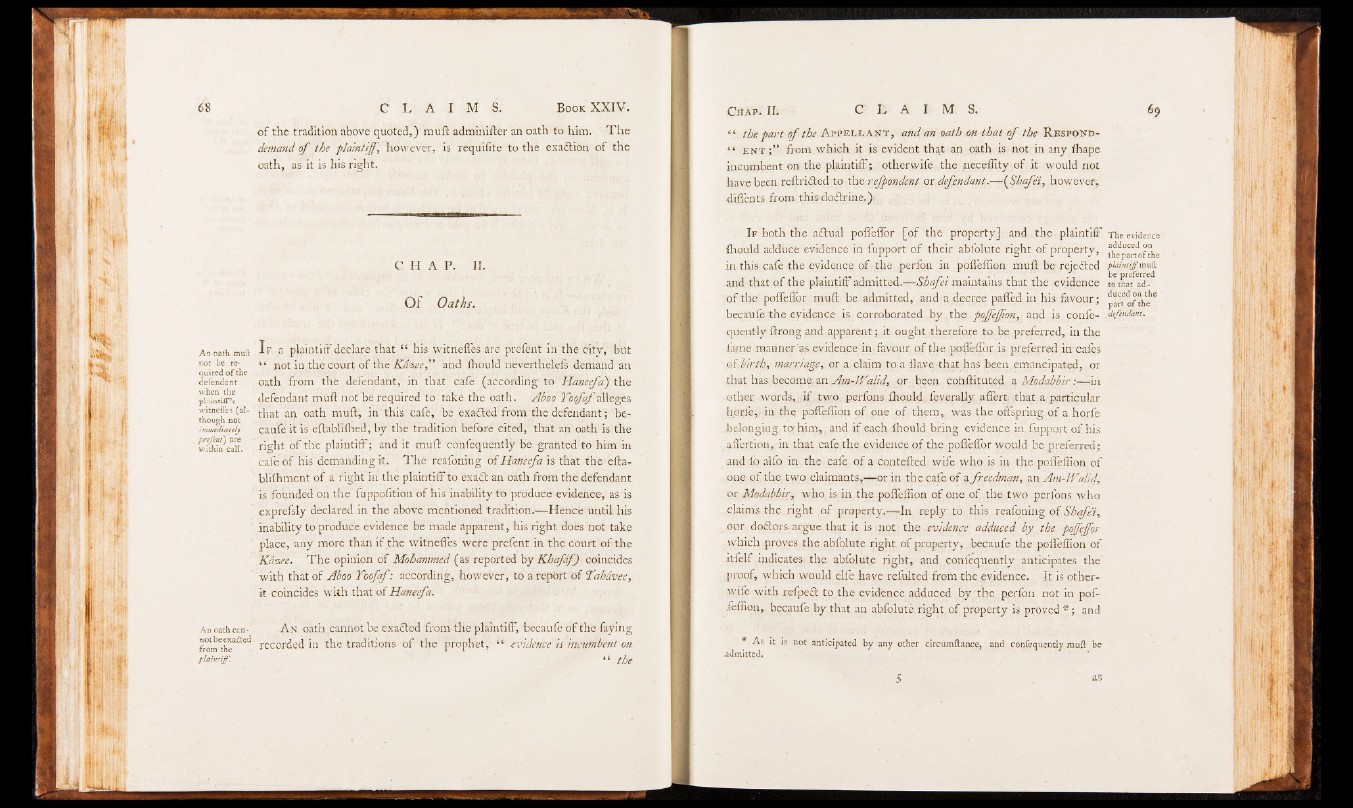
An oath mull
not be required
o f the
defendant
when the
plaintiff’s
witneffes (although
not
immediately
prefent) are
within call.
An oath cannot
be exacted
from the
plaintiff..
of the tradition above quoted,) muft adminifter an oath to him. T h e
demand o f the plaintiff, however, is requiflte to the exadtion of the
oath, as it is his right.
C H A P . II,
Of Oaths.
I f a plaintiff declare that | his witneffes are prefent in the city, but
“ not in the court of the Kdzee," and fhould neverthelefs demand an
oath from the defendant, in that'cafe (according to Haneefa) the
defendant muft not be required to'take the oath. AbodToofaf alleges
that an oath muft, in this cafe, be exafted from the defendant ; be-
caufe it is eftablilhed, by the tradition before' cited, that an oath- is the
right of the plaintiff"; and it muft coiifequently be granted to him in
cafe of his demanding it. The reafoning of Haneefa is that the efta-
blilhment o f a right in the plaintiff to exa£t an oath from the defendant
is founded on the fuppofition of his inability to produce evidence, as is
exprefsly declared in the above mentioned tradition.— Hence until his
inability to produce evidence be made apparent, his right does riot take
place, any more than if the witneffes were prefent in thq court of the
Kdzee. The opinion of Mohammed (as reported by Khaf&f) coincides
with that of Aboo Toofcf: -according, however, to a report of Tahdvee,
it coincides with that of Haneefa.
An oath cannot be exaffed from the plaintiff, becaufe of the faying
recorded in the traditions of the prophet, “ evidence is incumbent on
“ the
“ the part o f the A p p e l l a n t , and an oath on that o f the R e s p o n d -
“ e n t ; ” from which it is evident that an oath is not in any fhape
in c u m b e n t on the plaintiff ; otherwife the neceflity of it would not
have been reftridted to the refpondent or defendant.— (Shcfei, however,
diflents from this-dodtrine.);.
If both the. adtual pofleflor [of the property]: and the plaintiff
fhould adduce evidence in fupport of their abfolute right of property,
in this» cafe the evidence; of the perfqn in pofl'eflion muft be rejected
and that of the plaintiff admitted.—Shcfei maintains that the evidence
of the' poffeffor muft be admitted, and a decr.ee paffed in his favour;
becaufe the evidence is corroborated by the ,poffeffion, and . is confe-
quently ftrong and apparent; it ought therefore to. be preferred, in the
fame mauner as evidence in favour of thepofTefloris preferred in cafes
' of birth, marriage, or a claim to a fla,ve that has been emancipated, or
that has become, an AmrWalid, or been conftituted a Modabbir:—-in
other words, , if two perfons fhould, feverally aflert that a particular
hoijfe,. in the poffeflion of. one of them,, was the offspring,of a horfe
belonging to? him,, and if eaqh fhould bring evidence in. fupport of his
.affertion, in that cafe the evidence of the pofleffor would be preferred;
aud io alfo in the, cafe, of a contefted wife who is ,in the poffeflion of
one of the two claimants,—or in the.cafe, of a freefman, an Am-lValid,
or Modabbir, who is in the poffeflion of one of the .two perfons who
claims the right of property,—In reply to this. reafoning of Shcfei,
opr doctors, argue that it is not th e . evidence adduced by the poffeffor
which proves the abfolute right of property, beca.ufe the poffeflion of
itfelf .indicates the abfolute right, and confequeiitly anticipates the
proof, which would elfe have refulted from the evidence. - It is other-
wife with refpeft to the evidence adduced by the perfon not in poffeflion,
becaufe by that an abfolute right,of property is proved *; and
* A s -it is not anticipated b y any other circumftance, and confequently muft be
.admitted,.
The evidence
adduced on
ihepartof the
p la in t i f f mufl:
be preferred
to that adduced
on the
part o f the
defendant.